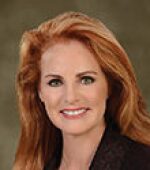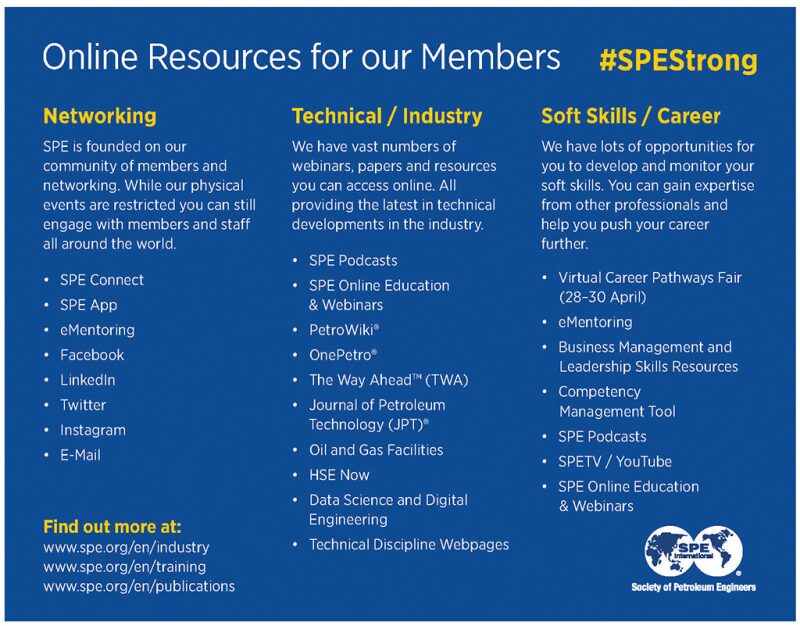
Today is 22 March, and instead of traveling to meet with passionate SPE members, I am sitting in my dining room, or better known as my new remote office. It has been months of unprecedented stress, sadness, and uncertainty for all of us. Social distancing and learning to live our lives in a more isolated state is the price we must all pay to stay safe. The news cycle seems to change by the minute, and we cannot be sure when our lives will return to normal. An unfortunate side effect of this mandated isolation is that the list of postponed or canceled SPE events has grown, while estimated financial losses continue to mount throughout the industry. No company or organization could have predicted our industry would be facing a viral pandemic, coupled with oil prices at their lowest levels in almost 2 decades. This is a time to put our heads together and come up with a new plan. This is what oil and gas does best.
After adjusting to the last period of lower prices, SPE is now better prepared to serve its members in these challenging times.
All the adversity I’ve had in my life, all my troubles and obstacles, have strengthened me … You may not realize it when it happens, but a kick in the teeth may be the best thing for you.
Like so many other companies, SPE was forced to downsize during the last downturn, and it was a difficult process. For those who served on the SPE Board of Directors during 2015 and 2016, it was painful yet necessary to reduce or eliminate programs that we could not financially justify due to the loss in event revenue. SPE events provide approximately 70% of the total income required for our Society to operate. It was also necessary to lower overhead costs by reducing our number of employees. SPE used this reduction in force to reorganize and streamline divisions, which resulted in greater collaboration and regional offices operating more efficiently. When the industry started to correct itself and event revenue returned, the board of directors remained cautious about spending. Their goal was to put SPE in a position to withstand another downturn, both financially and through the member programs we offer. We must be able to deliver on our mission to collect, disseminate, and exchange technical knowledge concerning the exploration, development, and production of oil and gas resources, and related technologies for the public benefit. We believe we have more tools in place to accomplish this than in our 63-year history.
SPE’s current strategic plan is heavily focused on the continued digital transformation of our publications and programs. Even while we are quarantined in our homes, we are now able to access SPE’s comprehensive content in ways that were not available a few years ago, and that will only continue to improve with projects already underway. We can also quickly provide information to all our members on all the ways they can stay engaged remotely.
Today, we have more of our members utilizing social media than ever before, and it has been so uplifting to see them reach out to one another with words of encouragement and new ideas to remain engaged. One of those members, Nihal Mounir, responded to one of my Tweets about utilizing the SPE App to launch the “SPE Stay Strong” campaign. In less than 24 hours, SPE staff worked with Nihal to create a framework for this new program to provide a daily source of short videos featuring technical and nontechnical content for our members. This grassroots campaign, which launched in April, offers SPE members the much-needed connection and consistency that has gone missing as we navigate these unfamiliar times.
The greatness of a community is most accurately measured by the compassionate actions of its members.
SPE staff has been working diligently on ways we can “think outside the box” to keep our members informed and engaged. Many of our fantastic Distinguished Lecturers quickly arranged to make their presentations available in a webinar format, and SPE staff increased our capacity to produce additional webinars. Dawit Tegbaru, SPE’s managing editor for our peer-reviewed journals, creatively established virtual “office hours” to answer questions from current and prospective authors and lend insights about the peer-review publication process. A full virtual SPE event, Career Pathways, was held in April, and the board has been working on additional virtual conference offerings. Our Members-in-Transition program, which was created during the last downturn and has been brought back, is filled with helpful information and guidance for our members who become unemployed under these recent circumstances. These are just a few examples of how SPE has repositioned to serve our members better.

The board and staff started holding regular virtual meetings in March to stay abreast of the industry dynamics and to strategize on how SPE can not only survive but improve on the value we offer as a society. I am so appreciative of these members, who continue to dedicate their efforts at a time when the demands of their regular jobs are at an all-time high.
Sometimes you have to get knocked down lower than you have ever been, to stand up taller than you ever were.
How well has our industry learned and adapted from the last downturn? Deloitte analyzed 843 listed oil and gas companies worldwide to understand this better. Their study, published as a six-part series in 2019, included companies from upstream, oilfield services, midstream, and refining and marketing sectors (https://www2.deloitte.com/us/en/insights/industry/oil-and-gas/decoding-oil-gas-downturn.html). Could the recommendations from this study remain relevant in our current situation? Here are a few of their suggestions:
- O&G companies with fit-for-future portfolios should effectively position themselves as a strong value/yield investment and strongly talk about their progress in growing free cash flows, maintaining shareholder distributions, and increasing their ROC [return on capital] to investors.
- Advantaged segments and players should bring a balance to today’s lopsided contractual relationships by sharing in the economics of efficiencies created by contractors and vendors, thus providing a win-win relationship.
- O&G companies across the value chain should stay invested in harnessing capabilities of the new-age workforce and remain open to accelerated innovation happening outside the industry as well.
On a positive note, our industry has amassed more data across all disciplines, implemented remote surveillance platforms, and utilized data analytics to make better decisions faster than ever before. This allows us to react more efficiently and effectively to economic downturns. Our industry has been challenged many times before, and each time we have emerged stronger and wiser. With continued ingenuity, innovation, and collaboration in all sectors of our industry, we will prevail again. The main difference this time is that it will be done virtually with one another, with some of us still in our pajamas. Stay safe and stay strong!
Instead of a question, this month I have a simple request. Call a colleague. Talk to them via phone, FaceTime, etc., and see how they are coping. We are all under considerable stress and by reaching out to someone for a brief conversation, we can lift spirits and help one another. To hear Shauna’s President’s Column via podcast, please go to www.spe.org/en/podcasts.

